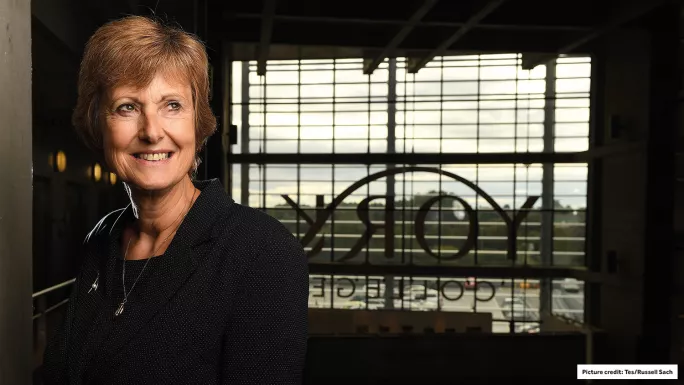- Home
- ‘Government can’t keep starving us of funding’
‘Government can’t keep starving us of funding’

Alison Birkinshaw reflects on her 33-year career in further education as “a series of really lucky opportunities that I have been fortunate enough to take”.
And the York College principal is currently enjoying the most high-profile opportunity to come her way yet. On Tuesday, Birkinshaw will take to the stage at the Association of Colleges’ flagship annual conference as its president.
It was a search of the Tes jobs section more than 30 years ago that ended up leading to Birkinshaw’s love affair with FE.
“I bought Tes one Friday and thought, ‘OK, I better get a job,’” she recalls. “So I just applied for every single music and English job, wherever it was. And Nelson and Colne College was the first interview I got. At that point, I didn’t really know what a college was or where Nelson was. In my simple mind, I got on a train and went for the interview.”
Despite this, Birkinshaw fought off 70 other applicants to be offered the job as a music lecturer. “It was just a piece of luck,” she says. “And I never looked back. I found my feet almost immediately - I see it almost as fate, because the FE sector really suited me. I loved working with students at that age range.”
She eventually left Nelson and Colne to become deputy principal at another Lancashire institution, Runshaw College, in 2000, before returning four years later to her first college as principal: “I knew in my gut, somehow, that that was my job.”
Birkinshaw left to lead York College in 2008, and has remained there since. She was made an OBE in 2012 for services to education.
During the current academic year, she will split her day job with the new role, spending roughly half of her week on AoC duty and the rest of the time at the college.
The loss of innovation
The college sector that Birkinshaw now represents has changed significantly since she first entered it. “When I first started in 1984, there was a lot more innovative practice,” she recalls. “The funding of the students was more generous, they could do more hours in college, and then you could design more innovative programmes to suit them.”
The change, she explains, is down to financial pressures on colleges. “The funding is now much more limited, and we have lost some of that innovation. So although we have better facilities, the real pity now is that colleges are only funded for post-16 education for 15 hours a week, and I can’t see how you can put together a programme that gives that really solid, broad education for our young people. It doesn’t even cover three A levels.”
The lack of investment in post-16 education means that students are being short-changed, Birkinshaw says. “Of course, colleges like mine do our absolute best to give that broad education, but it [comes] at a cost, and I am not sure how long we can continue to do that now. Government has to see that it cannot starve post-16 education funding in this way, because it is going to impact later on down the line on the skills our students have.”
Funding pressures also have had a knock-on effect on college staff pay. A national pay freeze in 2015-16, which resulted in strike action in colleges across the country, was followed by a below-inflation, 1 per cent pay rise in 2016-17. The same increase has been tabled this year.
Birkinshaw says additional funding is needed to ensure that staff get the pay they deserve. “Even giving staff a decent pay award is a major challenge, because the cost and the income don’t meet any more,” she says. “It is an absolute imperative that we do something about that.”

While extra funding promised by the Department for Education to pay for the introduction of the new T levels - eventually rising to more £500 million a year - is a positive development, financial pressures on the entire post-16 sector need to be addressed, she adds.
Not surprisingly, Birkinshaw has signalled her backing for the Support Our Sixth-formers campaign being run by the AoC, the Association of School and College Leaders and the Sixth Form Colleges Association, which is calling for a £200-per-student uplift in post-16 funding.
“That would really go a long way in dealing with some of those funding gaps that we have got,” she says. “It would help us recruit staff, invest in the equipment we need, it would help us save minority subjects from going under.”
The funding pressure was one of two key issues that persuaded Birkinshaw to stand for AoC president. The other was the contentious issue of GCSE English and maths resits. The government has made it a condition of colleges’ funding that students who only achieve a D or 3 in English or maths will have to retake the qualification. This has caused the overall number of entries among students aged 17 and over to increase significantly; of the 149,537 older students who sat their legacy GCSE maths exams this summer, only 24.4 per cent managed to achieve a grade C or better, with a slightly higher pass rate of 29 per cent recorded in English.
‘Inappropriate’ curriculum
Birkinshaw believes it is time to get rid of the policy. “I think it is important to emphasise that I do see it as important to work with our students to make sure they are literate and numerate,” she adds. “But the curriculum for English, in particular, is just so inappropriate.
“If the policymakers actually looked at the specifications that they are making our hospitality and catering or our motor-vehicle students sit, they would be really shocked. I would also challenge our policymakers to sit the exam themselves and see what mark they would get, because it is really hard.”
Functional skills qualifications - a frequently mooted alternative to GCSEs - are currently undergoing reform to improve their image in the eyes of employers, and this month, the government launched a consultation into the revised maths and English content. The reformed qualification in English will include phonics, while maths courses will have a stronger focus on context.
Birkinshaw says she has some reservations. “We need a fit-for-purpose qualification, which could be functional skills - but I am not sure it is the current proposal for functional skills - that really meets the needs of our largely vocational students.”
But as for her AoC role, at least, Birkinshaw is confident that her vast experience in the FE sector will stand her in good stead.
“They say history is very important in York, and I have got the history. I know how the FE sector has developed. I do get to grips with the detail, I am a bit of a hands-on principal.
“There are lots of people who are just as able as me to be AoC president, I am absolutely sure, but I will just do my best.”
Keep reading for just £1 per month
You've reached your limit of free articles this month. Subscribe for £1 per month for three months and get:
- Unlimited access to all Tes magazine content
- Exclusive subscriber-only stories
- Award-winning email newsletters



